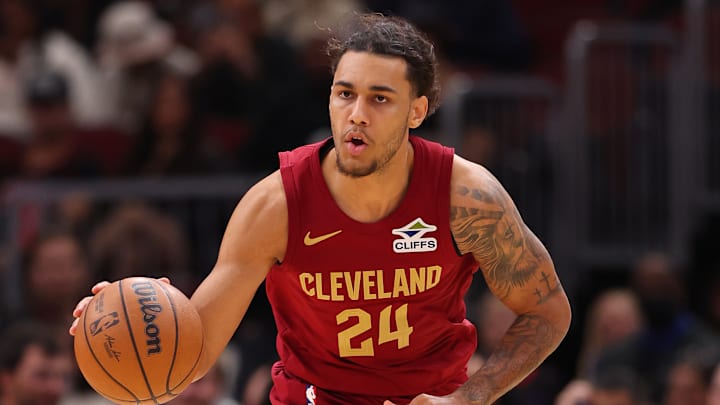Kenny Atkinson didn't want to do it.
Coming off of an emotional and intense battle with the Boston Celtics, a three-point loss in Boston to the defending champions, the Cleveland Cavaliers were physically and emotionally drained. They were also significantly shorthanded, with Sam Merrill and Darius Garland joining Dean Wade, Max Strus, Isaac Okoro and Caris LeVert on the shelf.
Yet the Cavaliers had to race home Wednesday night to host the New Orleans Pelicans - a short-handed team in their own right, but also one that upset the Denver Nuggets with their skeleton crew and was a threat to pull off a surprise win in Cleveland. The Cavs had to figure out how to cobble together a rotation and not let the loss to Boston be compounded into two.
Ty Jerome replacing Darius Garland in the starting lineup was the obvious choice, but who was going to start at small forward? The Cavaliers have been playing without starter Max Strus all season, but they were without every other rotation wing on the roster for Wednesday's game. Who would be elevated into the lineup? Would Craig Porter Jr. get the nod for a three-guard look? Georges Niang playing out of position at the 3?
The answer for assistant coach DeMarre Carroll was obvious: start rookie Jaylon Tyson.
DeMarre Carroll wanted to start Jaylon Tyson
The Cavaliers selected Tyson with the 20th pick in this year's NBA Draft, and he showed flashes in Las Vegas Summer League and the preseason that he is a bona fide NBA player. Yet the depth of the Cavaliers and a minor hip injury limited Tyson's playing time; he essentially only entered games when they became blowouts, and in six appearances leading into Wednesday night he never played more than eight minutes, and had scored just seven total points.
That's the player that Carroll and other Cleveland assistant coaches advocated to start against the Pelicans. They thought he was ready and should get the opportunity to not only play, but start next to Donovan Mitchell, Evan Mobley and Jarrett Allen.
Kenny Atkinson wasn't just skeptical, he was actively fighting against it. As Atkinson relayed after the game, his opinion was that "he just hasn't really played at all" - a very reasonable stance to take. Yet Carroll was adamant, and he and the other coaches "pushed and pushed" for Tyson to get the start.
In the elevator with Atkinson, Carroll said "we gotta start Tyson. It's important for a young guy to be around vets to start."
Atkinson showed the level of trust he has in his coaching staff by moving off of his stance and starting Jaylon Tyson. And it paid off in a major way.
Jaylon Tyson had his breakout game
Jaylon Tyson not only started but played a team-high 37 minutes, and he contributed in every facet of the game. He scored 16 points, starting the game 6-for-6 before missing shots late as the primary option in garbage time. He scored from all three levels, showing off touch on his jumper and scoring around the rim. With a tight handle, he was comfortable working his way inside to make plays for himself or others.
What is even more impressive is that Tyson had a whopping seven assists, serving as a connective playmaker, especially in transition. He assisted on baskets for Ty Jerome, Luke Travers, Georges Niang, JT Thor and Tristan Thompson, looking incredibly comfortable with the ball in his hands.
Add in 11 rebounds, tied for the team-high, and a pair of steals and you get a complete performance from a rookie seeing the first significant action of his career. He was +20 on the night, and looked like a player ready to ascend into a larger role.
Our Rook is wasting no time in his first start! @jaylontyson | #LetEmKnow pic.twitter.com/desN3Zl7VH
— Cleveland Cavaliers (@cavs) November 21, 2024
The Cavaliers needed help on Wednesday night. Donovan Mitchell and Evan Mobley were clearly tired. Ty Jerome stepped in and scorched the nets in the first half, scoring a career-high 27 points with seven 3-pointers, but he couldn't do it alone. He needed someone to step in and make a complete lineup. Tyson did just that.
What does it mean moving forward? It may not mean much for the full-strength Cavaliers, who already have a plethora of worthy players who will demand minutes, especially when Max Strus returns. Yet when injuries do pop up, Tyson looks like a player ready to step into a larger role; perhaps not 37 minutes, but he has something to contribute in any role.
And against a team like the Boston Celtics, Tyson's size and athleticism on the wing give the Cavaliers another weapon to deploy. If Tyson continues to develop and has forced his way into the rotation by the end of the season, he makes the Cavaliers that much more likely to match up with the Celtics or any foe they face in the NBA Finals.
The Cavaliers have one of the deepest rosters in the NBA, and now they may have found yet another player ready to contribute to a championship contender. And in large part, the Cavs have DeMarre Carroll to thank.
